Impact of Shift-Based Nursing on Mental Health: A Literature Review
VerifiedAdded on 2022/09/07
|23
|6684
|15
Literature Review
AI Summary
This literature review examines the impact of shift work, including regular night and rotational shifts, on the mental and psychological stability of registered nurses. It explores the ethical and legal duties of nurses, as outlined by the American Nurses Association, and the challenges they face in critical situations and emergency care, particularly during night shifts. The review analyzes scholarly articles to discuss the negative effects of shift work on nurses' mental health, focusing on job dissatisfaction, stress, anxiety, and depression. Key findings highlight the impact of shift-based duties on sleep quality, the causes of anxiety and stress, and the consequences of rotational shifts. The review also suggests solutions, such as positive communication and meditation therapies, to mitigate job dissatisfaction and promote emotional well-being. The introduction provides an overview of the shift work system in healthcare, emphasizing the continuous need for nursing care and the responsibilities nurses undertake, especially during night shifts. The search strategy involved a systematic review of databases like EMBASE, Medline, PubMed, and Psych INFO, with specific search limiters applied to refine the search. The review's themes include the impact of shift-based duties on sleep quality, causes of anxiety and stress, and the consequences of rotational shifts, with findings based on both primary and secondary research. The conclusion emphasizes the importance of addressing the challenges nurses face to ensure their mental health and job satisfaction.

qwertyuiopasdfghjklzxcvbnmqw
ertyuiopasdfghjklzxcvbnmqwert
yuiopasdfghjklzxcvbnmqwertyui
opasdfghjklzxcvbnmqwertyuiop
asdfghjklzxcvbnmqwertyuiopasd
fghjklzxcvbnmqwertyuiopasdfgh
jklzxcvbnmqwertyuiopasdfghjkl
zxcvbnmqwertyuiopasdfghjklzxc
vbnmqwertyuiopasdfghjklzxcvb
nmqwertyuiopasdfghjklzxcvbnm
qwertyuiopasdfghjklzxcvbnmqw
ertyuiopasdfghjklzxcvbnmqwert
yuiopasdfghjklzxcvbnmqwertyui
opasdfghjklzxcvbnmqwertyuiop
asdfghjklzxcvbnmqwertyuiopasd
fghjklzxcvbnmqwertyuiopasdfgh
jklzxcvbnmrtyuiopasdfghjklzxcv
Shift Based Nursing Issues
Literature Review
12/24/2019
ertyuiopasdfghjklzxcvbnmqwert
yuiopasdfghjklzxcvbnmqwertyui
opasdfghjklzxcvbnmqwertyuiop
asdfghjklzxcvbnmqwertyuiopasd
fghjklzxcvbnmqwertyuiopasdfgh
jklzxcvbnmqwertyuiopasdfghjkl
zxcvbnmqwertyuiopasdfghjklzxc
vbnmqwertyuiopasdfghjklzxcvb
nmqwertyuiopasdfghjklzxcvbnm
qwertyuiopasdfghjklzxcvbnmqw
ertyuiopasdfghjklzxcvbnmqwert
yuiopasdfghjklzxcvbnmqwertyui
opasdfghjklzxcvbnmqwertyuiop
asdfghjklzxcvbnmqwertyuiopasd
fghjklzxcvbnmqwertyuiopasdfgh
jklzxcvbnmrtyuiopasdfghjklzxcv
Shift Based Nursing Issues
Literature Review
12/24/2019
Paraphrase This Document
Need a fresh take? Get an instant paraphrase of this document with our AI Paraphraser
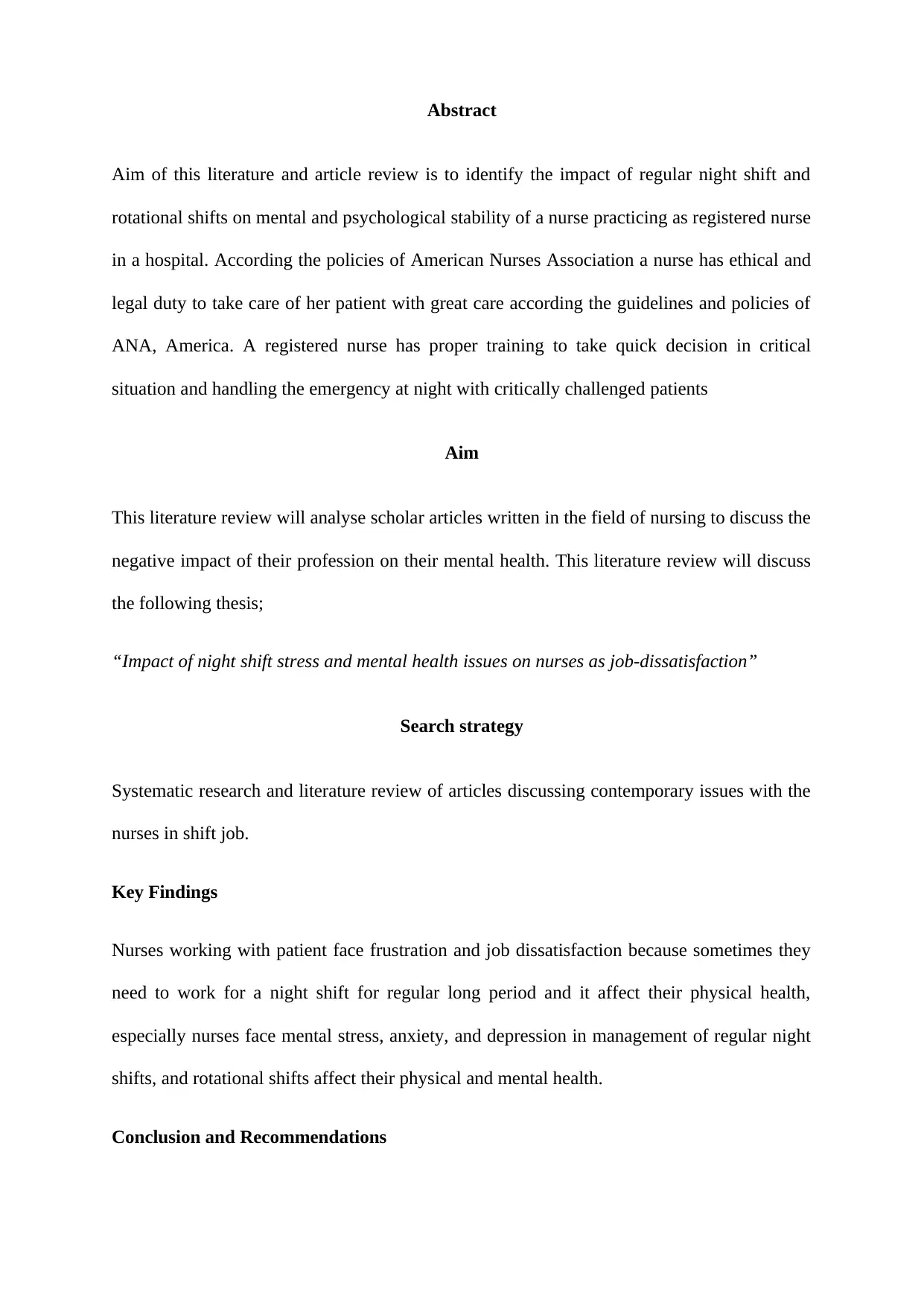
Abstract
Aim of this literature and article review is to identify the impact of regular night shift and
rotational shifts on mental and psychological stability of a nurse practicing as registered nurse
in a hospital. According the policies of American Nurses Association a nurse has ethical and
legal duty to take care of her patient with great care according the guidelines and policies of
ANA, America. A registered nurse has proper training to take quick decision in critical
situation and handling the emergency at night with critically challenged patients
Aim
This literature review will analyse scholar articles written in the field of nursing to discuss the
negative impact of their profession on their mental health. This literature review will discuss
the following thesis;
“Impact of night shift stress and mental health issues on nurses as job-dissatisfaction”
Search strategy
Systematic research and literature review of articles discussing contemporary issues with the
nurses in shift job.
Key Findings
Nurses working with patient face frustration and job dissatisfaction because sometimes they
need to work for a night shift for regular long period and it affect their physical health,
especially nurses face mental stress, anxiety, and depression in management of regular night
shifts, and rotational shifts affect their physical and mental health.
Conclusion and Recommendations
Aim of this literature and article review is to identify the impact of regular night shift and
rotational shifts on mental and psychological stability of a nurse practicing as registered nurse
in a hospital. According the policies of American Nurses Association a nurse has ethical and
legal duty to take care of her patient with great care according the guidelines and policies of
ANA, America. A registered nurse has proper training to take quick decision in critical
situation and handling the emergency at night with critically challenged patients
Aim
This literature review will analyse scholar articles written in the field of nursing to discuss the
negative impact of their profession on their mental health. This literature review will discuss
the following thesis;
“Impact of night shift stress and mental health issues on nurses as job-dissatisfaction”
Search strategy
Systematic research and literature review of articles discussing contemporary issues with the
nurses in shift job.
Key Findings
Nurses working with patient face frustration and job dissatisfaction because sometimes they
need to work for a night shift for regular long period and it affect their physical health,
especially nurses face mental stress, anxiety, and depression in management of regular night
shifts, and rotational shifts affect their physical and mental health.
Conclusion and Recommendations
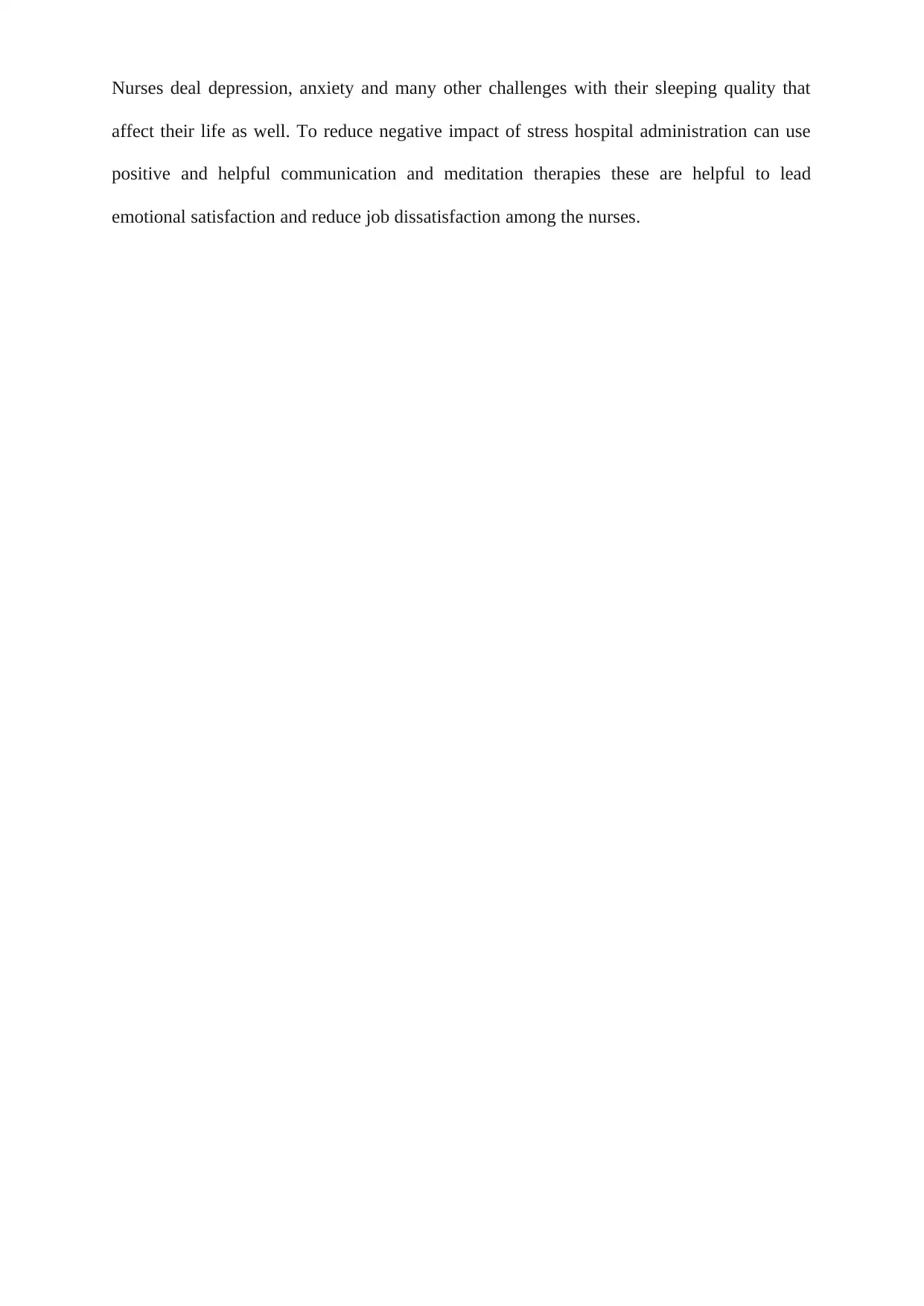
Nurses deal depression, anxiety and many other challenges with their sleeping quality that
affect their life as well. To reduce negative impact of stress hospital administration can use
positive and helpful communication and meditation therapies these are helpful to lead
emotional satisfaction and reduce job dissatisfaction among the nurses.
affect their life as well. To reduce negative impact of stress hospital administration can use
positive and helpful communication and meditation therapies these are helpful to lead
emotional satisfaction and reduce job dissatisfaction among the nurses.
⊘ This is a preview!⊘
Do you want full access?
Subscribe today to unlock all pages.

Trusted by 1+ million students worldwide
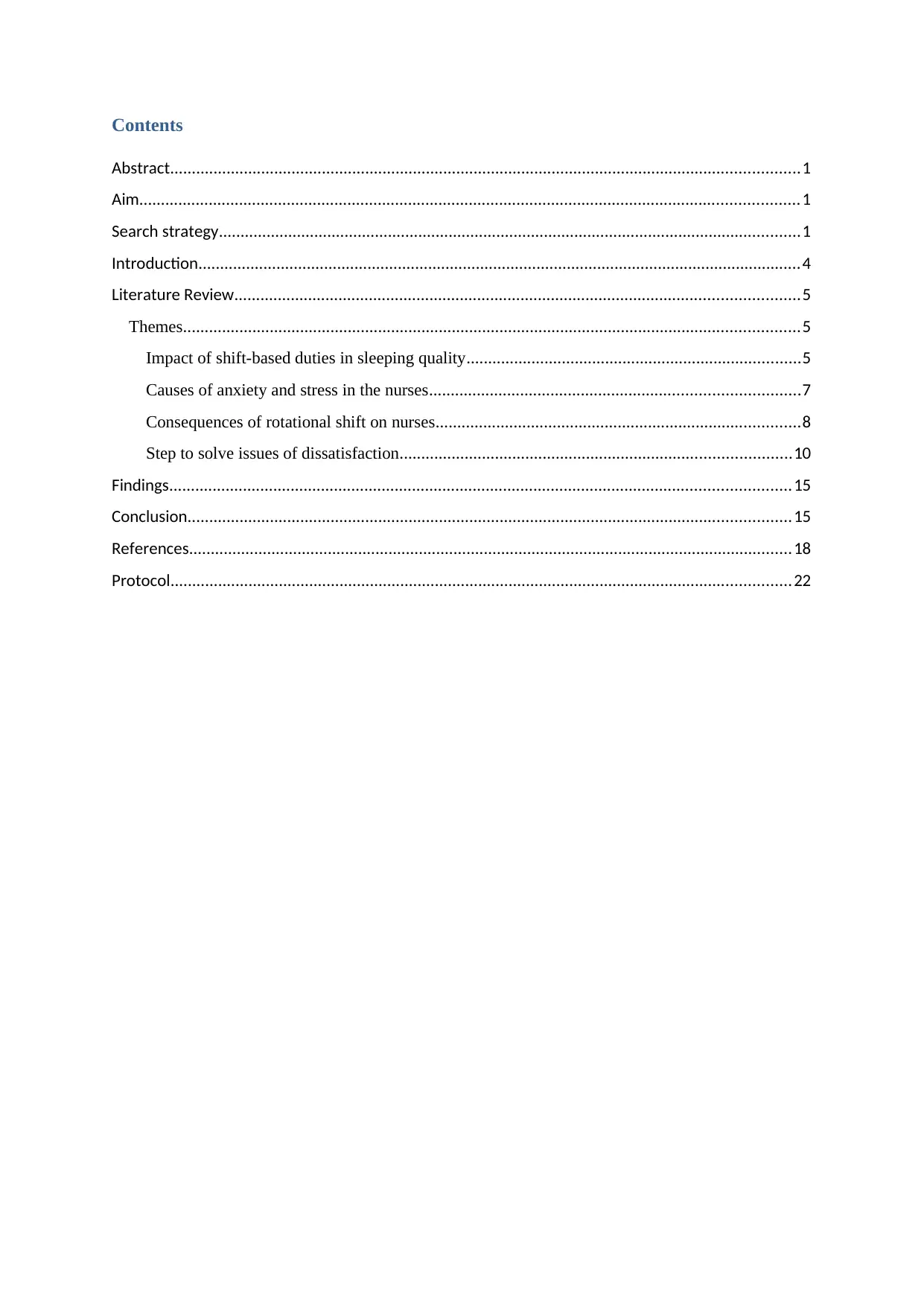
Contents
Abstract.................................................................................................................................................1
Aim........................................................................................................................................................1
Search strategy......................................................................................................................................1
Introduction...........................................................................................................................................4
Literature Review..................................................................................................................................5
Themes..............................................................................................................................................5
Impact of shift-based duties in sleeping quality.............................................................................5
Causes of anxiety and stress in the nurses.....................................................................................7
Consequences of rotational shift on nurses....................................................................................8
Step to solve issues of dissatisfaction..........................................................................................10
Findings...............................................................................................................................................15
Conclusion...........................................................................................................................................15
References...........................................................................................................................................18
Protocol...............................................................................................................................................22
Abstract.................................................................................................................................................1
Aim........................................................................................................................................................1
Search strategy......................................................................................................................................1
Introduction...........................................................................................................................................4
Literature Review..................................................................................................................................5
Themes..............................................................................................................................................5
Impact of shift-based duties in sleeping quality.............................................................................5
Causes of anxiety and stress in the nurses.....................................................................................7
Consequences of rotational shift on nurses....................................................................................8
Step to solve issues of dissatisfaction..........................................................................................10
Findings...............................................................................................................................................15
Conclusion...........................................................................................................................................15
References...........................................................................................................................................18
Protocol...............................................................................................................................................22
Paraphrase This Document
Need a fresh take? Get an instant paraphrase of this document with our AI Paraphraser
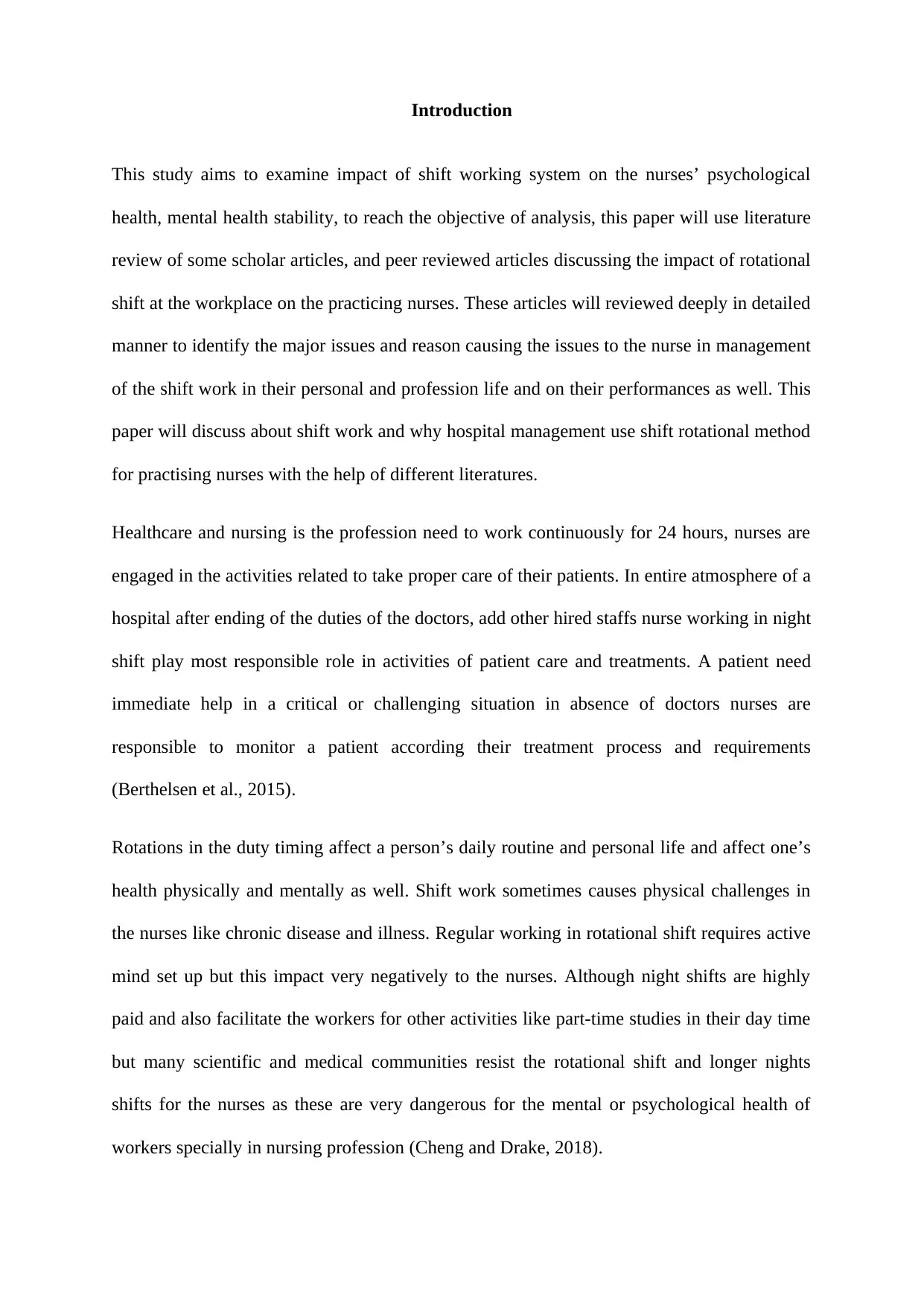
Introduction
This study aims to examine impact of shift working system on the nurses’ psychological
health, mental health stability, to reach the objective of analysis, this paper will use literature
review of some scholar articles, and peer reviewed articles discussing the impact of rotational
shift at the workplace on the practicing nurses. These articles will reviewed deeply in detailed
manner to identify the major issues and reason causing the issues to the nurse in management
of the shift work in their personal and profession life and on their performances as well. This
paper will discuss about shift work and why hospital management use shift rotational method
for practising nurses with the help of different literatures.
Healthcare and nursing is the profession need to work continuously for 24 hours, nurses are
engaged in the activities related to take proper care of their patients. In entire atmosphere of a
hospital after ending of the duties of the doctors, add other hired staffs nurse working in night
shift play most responsible role in activities of patient care and treatments. A patient need
immediate help in a critical or challenging situation in absence of doctors nurses are
responsible to monitor a patient according their treatment process and requirements
(Berthelsen et al., 2015).
Rotations in the duty timing affect a person’s daily routine and personal life and affect one’s
health physically and mentally as well. Shift work sometimes causes physical challenges in
the nurses like chronic disease and illness. Regular working in rotational shift requires active
mind set up but this impact very negatively to the nurses. Although night shifts are highly
paid and also facilitate the workers for other activities like part-time studies in their day time
but many scientific and medical communities resist the rotational shift and longer nights
shifts for the nurses as these are very dangerous for the mental or psychological health of
workers specially in nursing profession (Cheng and Drake, 2018).
This study aims to examine impact of shift working system on the nurses’ psychological
health, mental health stability, to reach the objective of analysis, this paper will use literature
review of some scholar articles, and peer reviewed articles discussing the impact of rotational
shift at the workplace on the practicing nurses. These articles will reviewed deeply in detailed
manner to identify the major issues and reason causing the issues to the nurse in management
of the shift work in their personal and profession life and on their performances as well. This
paper will discuss about shift work and why hospital management use shift rotational method
for practising nurses with the help of different literatures.
Healthcare and nursing is the profession need to work continuously for 24 hours, nurses are
engaged in the activities related to take proper care of their patients. In entire atmosphere of a
hospital after ending of the duties of the doctors, add other hired staffs nurse working in night
shift play most responsible role in activities of patient care and treatments. A patient need
immediate help in a critical or challenging situation in absence of doctors nurses are
responsible to monitor a patient according their treatment process and requirements
(Berthelsen et al., 2015).
Rotations in the duty timing affect a person’s daily routine and personal life and affect one’s
health physically and mentally as well. Shift work sometimes causes physical challenges in
the nurses like chronic disease and illness. Regular working in rotational shift requires active
mind set up but this impact very negatively to the nurses. Although night shifts are highly
paid and also facilitate the workers for other activities like part-time studies in their day time
but many scientific and medical communities resist the rotational shift and longer nights
shifts for the nurses as these are very dangerous for the mental or psychological health of
workers specially in nursing profession (Cheng and Drake, 2018).
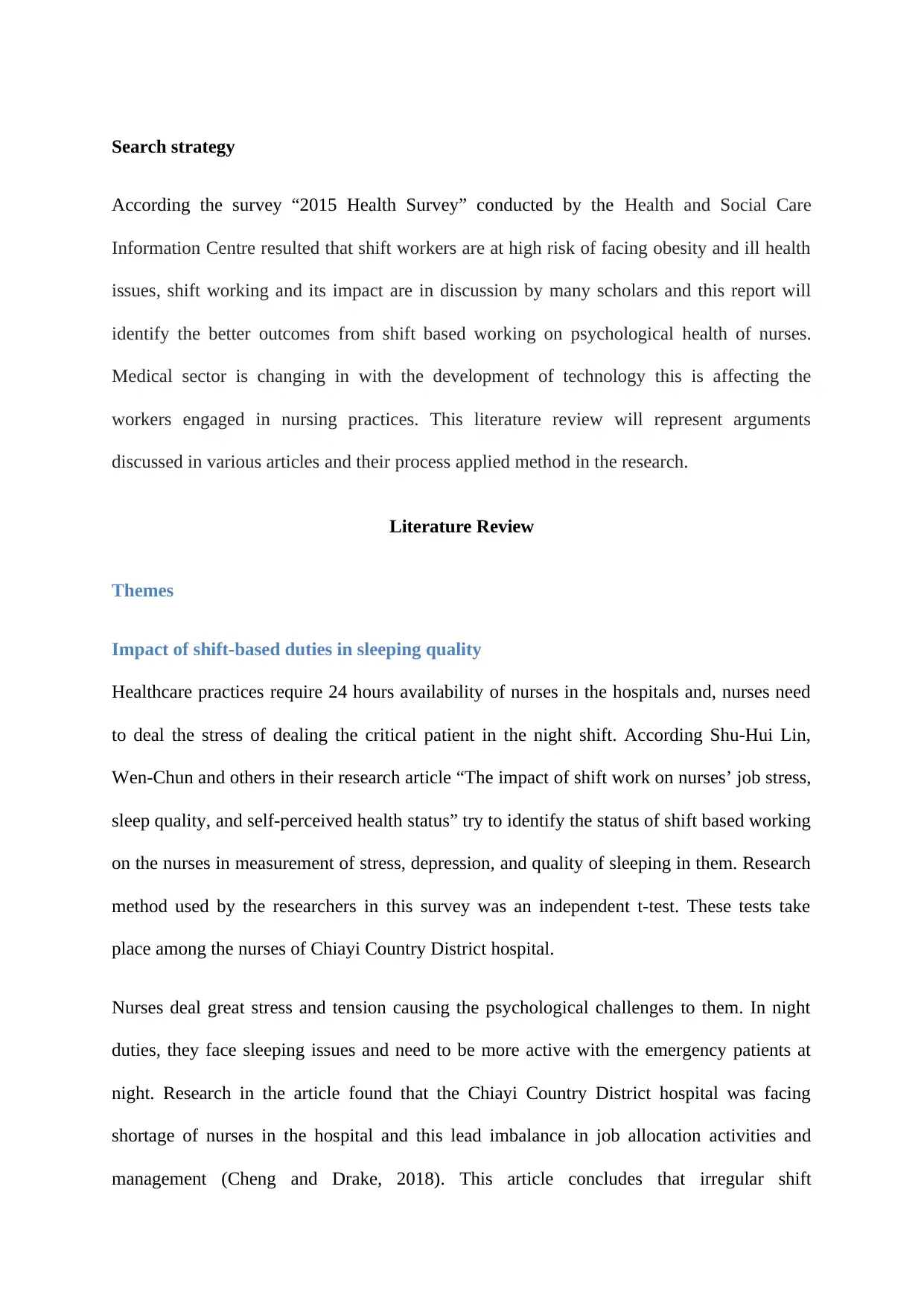
Search strategy
According the survey “2015 Health Survey” conducted by the Health and Social Care
Information Centre resulted that shift workers are at high risk of facing obesity and ill health
issues, shift working and its impact are in discussion by many scholars and this report will
identify the better outcomes from shift based working on psychological health of nurses.
Medical sector is changing in with the development of technology this is affecting the
workers engaged in nursing practices. This literature review will represent arguments
discussed in various articles and their process applied method in the research.
Literature Review
Themes
Impact of shift-based duties in sleeping quality
Healthcare practices require 24 hours availability of nurses in the hospitals and, nurses need
to deal the stress of dealing the critical patient in the night shift. According Shu-Hui Lin,
Wen-Chun and others in their research article “The impact of shift work on nurses’ job stress,
sleep quality, and self-perceived health status” try to identify the status of shift based working
on the nurses in measurement of stress, depression, and quality of sleeping in them. Research
method used by the researchers in this survey was an independent t-test. These tests take
place among the nurses of Chiayi Country District hospital.
Nurses deal great stress and tension causing the psychological challenges to them. In night
duties, they face sleeping issues and need to be more active with the emergency patients at
night. Research in the article found that the Chiayi Country District hospital was facing
shortage of nurses in the hospital and this lead imbalance in job allocation activities and
management (Cheng and Drake, 2018). This article concludes that irregular shift
According the survey “2015 Health Survey” conducted by the Health and Social Care
Information Centre resulted that shift workers are at high risk of facing obesity and ill health
issues, shift working and its impact are in discussion by many scholars and this report will
identify the better outcomes from shift based working on psychological health of nurses.
Medical sector is changing in with the development of technology this is affecting the
workers engaged in nursing practices. This literature review will represent arguments
discussed in various articles and their process applied method in the research.
Literature Review
Themes
Impact of shift-based duties in sleeping quality
Healthcare practices require 24 hours availability of nurses in the hospitals and, nurses need
to deal the stress of dealing the critical patient in the night shift. According Shu-Hui Lin,
Wen-Chun and others in their research article “The impact of shift work on nurses’ job stress,
sleep quality, and self-perceived health status” try to identify the status of shift based working
on the nurses in measurement of stress, depression, and quality of sleeping in them. Research
method used by the researchers in this survey was an independent t-test. These tests take
place among the nurses of Chiayi Country District hospital.
Nurses deal great stress and tension causing the psychological challenges to them. In night
duties, they face sleeping issues and need to be more active with the emergency patients at
night. Research in the article found that the Chiayi Country District hospital was facing
shortage of nurses in the hospital and this lead imbalance in job allocation activities and
management (Cheng and Drake, 2018). This article concludes that irregular shift
⊘ This is a preview!⊘
Do you want full access?
Subscribe today to unlock all pages.

Trusted by 1+ million students worldwide
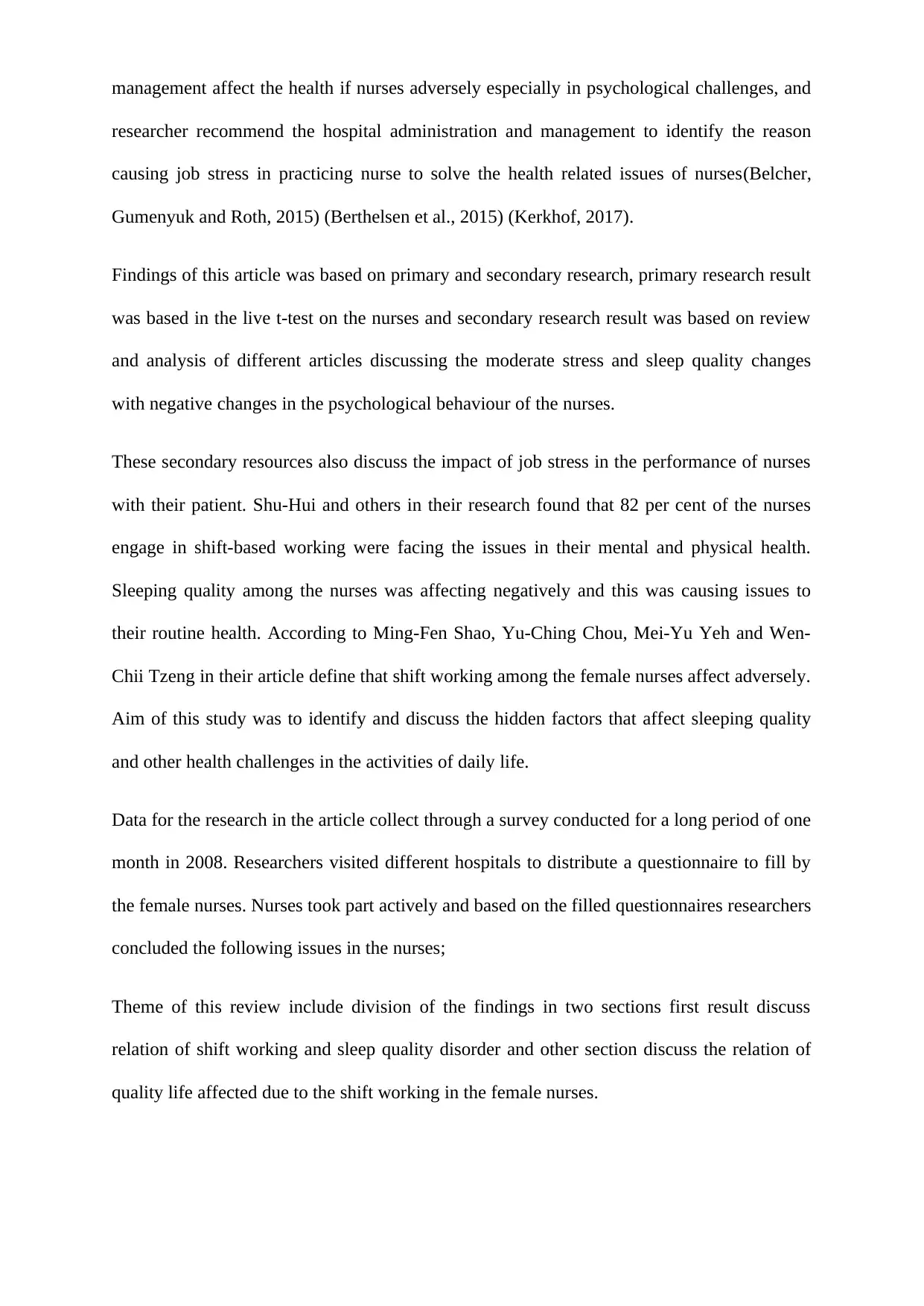
management affect the health if nurses adversely especially in psychological challenges, and
researcher recommend the hospital administration and management to identify the reason
causing job stress in practicing nurse to solve the health related issues of nurses(Belcher,
Gumenyuk and Roth, 2015) (Berthelsen et al., 2015) (Kerkhof, 2017).
Findings of this article was based on primary and secondary research, primary research result
was based in the live t-test on the nurses and secondary research result was based on review
and analysis of different articles discussing the moderate stress and sleep quality changes
with negative changes in the psychological behaviour of the nurses.
These secondary resources also discuss the impact of job stress in the performance of nurses
with their patient. Shu-Hui and others in their research found that 82 per cent of the nurses
engage in shift-based working were facing the issues in their mental and physical health.
Sleeping quality among the nurses was affecting negatively and this was causing issues to
their routine health. According to Ming-Fen Shao, Yu-Ching Chou, Mei-Yu Yeh and Wen-
Chii Tzeng in their article define that shift working among the female nurses affect adversely.
Aim of this study was to identify and discuss the hidden factors that affect sleeping quality
and other health challenges in the activities of daily life.
Data for the research in the article collect through a survey conducted for a long period of one
month in 2008. Researchers visited different hospitals to distribute a questionnaire to fill by
the female nurses. Nurses took part actively and based on the filled questionnaires researchers
concluded the following issues in the nurses;
Theme of this review include division of the findings in two sections first result discuss
relation of shift working and sleep quality disorder and other section discuss the relation of
quality life affected due to the shift working in the female nurses.
researcher recommend the hospital administration and management to identify the reason
causing job stress in practicing nurse to solve the health related issues of nurses(Belcher,
Gumenyuk and Roth, 2015) (Berthelsen et al., 2015) (Kerkhof, 2017).
Findings of this article was based on primary and secondary research, primary research result
was based in the live t-test on the nurses and secondary research result was based on review
and analysis of different articles discussing the moderate stress and sleep quality changes
with negative changes in the psychological behaviour of the nurses.
These secondary resources also discuss the impact of job stress in the performance of nurses
with their patient. Shu-Hui and others in their research found that 82 per cent of the nurses
engage in shift-based working were facing the issues in their mental and physical health.
Sleeping quality among the nurses was affecting negatively and this was causing issues to
their routine health. According to Ming-Fen Shao, Yu-Ching Chou, Mei-Yu Yeh and Wen-
Chii Tzeng in their article define that shift working among the female nurses affect adversely.
Aim of this study was to identify and discuss the hidden factors that affect sleeping quality
and other health challenges in the activities of daily life.
Data for the research in the article collect through a survey conducted for a long period of one
month in 2008. Researchers visited different hospitals to distribute a questionnaire to fill by
the female nurses. Nurses took part actively and based on the filled questionnaires researchers
concluded the following issues in the nurses;
Theme of this review include division of the findings in two sections first result discuss
relation of shift working and sleep quality disorder and other section discuss the relation of
quality life affected due to the shift working in the female nurses.
Paraphrase This Document
Need a fresh take? Get an instant paraphrase of this document with our AI Paraphraser
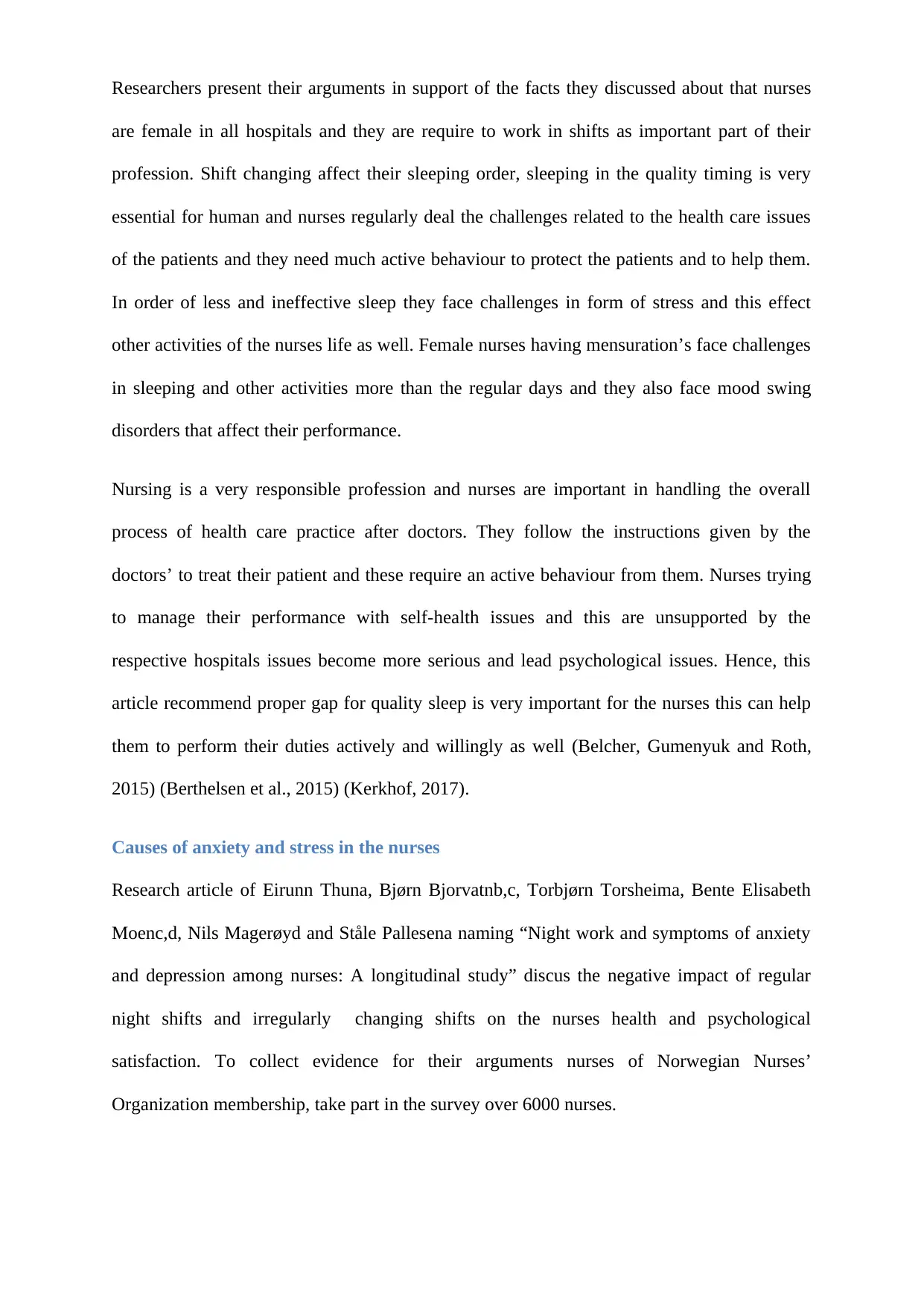
Researchers present their arguments in support of the facts they discussed about that nurses
are female in all hospitals and they are require to work in shifts as important part of their
profession. Shift changing affect their sleeping order, sleeping in the quality timing is very
essential for human and nurses regularly deal the challenges related to the health care issues
of the patients and they need much active behaviour to protect the patients and to help them.
In order of less and ineffective sleep they face challenges in form of stress and this effect
other activities of the nurses life as well. Female nurses having mensuration’s face challenges
in sleeping and other activities more than the regular days and they also face mood swing
disorders that affect their performance.
Nursing is a very responsible profession and nurses are important in handling the overall
process of health care practice after doctors. They follow the instructions given by the
doctors’ to treat their patient and these require an active behaviour from them. Nurses trying
to manage their performance with self-health issues and this are unsupported by the
respective hospitals issues become more serious and lead psychological issues. Hence, this
article recommend proper gap for quality sleep is very important for the nurses this can help
them to perform their duties actively and willingly as well (Belcher, Gumenyuk and Roth,
2015) (Berthelsen et al., 2015) (Kerkhof, 2017).
Causes of anxiety and stress in the nurses
Research article of Eirunn Thuna, Bjørn Bjorvatnb,c, Torbjørn Torsheima, Bente Elisabeth
Moenc,d, Nils Magerøyd and Ståle Pallesena naming “Night work and symptoms of anxiety
and depression among nurses: A longitudinal study” discus the negative impact of regular
night shifts and irregularly changing shifts on the nurses health and psychological
satisfaction. To collect evidence for their arguments nurses of Norwegian Nurses’
Organization membership, take part in the survey over 6000 nurses.
are female in all hospitals and they are require to work in shifts as important part of their
profession. Shift changing affect their sleeping order, sleeping in the quality timing is very
essential for human and nurses regularly deal the challenges related to the health care issues
of the patients and they need much active behaviour to protect the patients and to help them.
In order of less and ineffective sleep they face challenges in form of stress and this effect
other activities of the nurses life as well. Female nurses having mensuration’s face challenges
in sleeping and other activities more than the regular days and they also face mood swing
disorders that affect their performance.
Nursing is a very responsible profession and nurses are important in handling the overall
process of health care practice after doctors. They follow the instructions given by the
doctors’ to treat their patient and these require an active behaviour from them. Nurses trying
to manage their performance with self-health issues and this are unsupported by the
respective hospitals issues become more serious and lead psychological issues. Hence, this
article recommend proper gap for quality sleep is very important for the nurses this can help
them to perform their duties actively and willingly as well (Belcher, Gumenyuk and Roth,
2015) (Berthelsen et al., 2015) (Kerkhof, 2017).
Causes of anxiety and stress in the nurses
Research article of Eirunn Thuna, Bjørn Bjorvatnb,c, Torbjørn Torsheima, Bente Elisabeth
Moenc,d, Nils Magerøyd and Ståle Pallesena naming “Night work and symptoms of anxiety
and depression among nurses: A longitudinal study” discus the negative impact of regular
night shifts and irregularly changing shifts on the nurses health and psychological
satisfaction. To collect evidence for their arguments nurses of Norwegian Nurses’
Organization membership, take part in the survey over 6000 nurses.
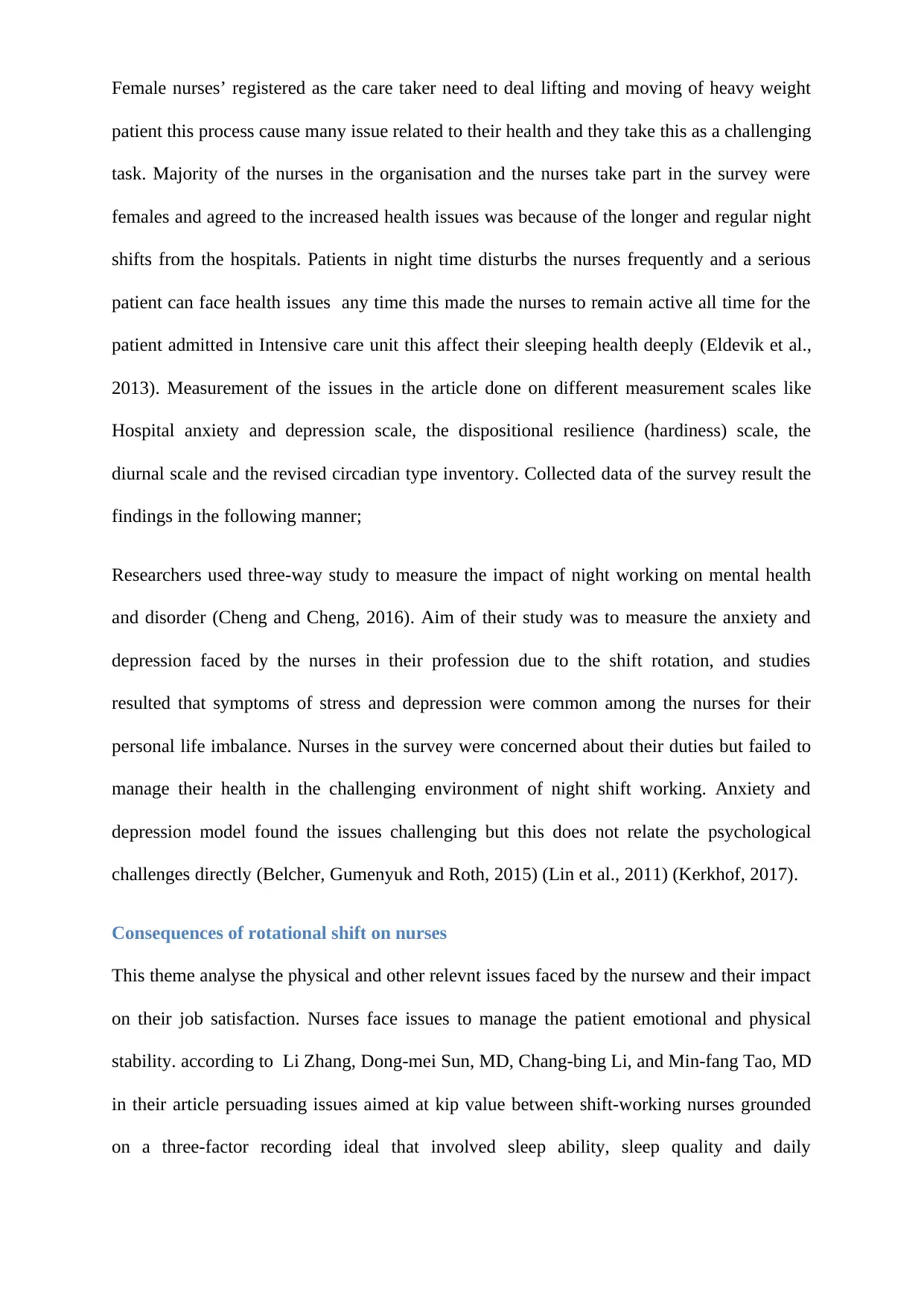
Female nurses’ registered as the care taker need to deal lifting and moving of heavy weight
patient this process cause many issue related to their health and they take this as a challenging
task. Majority of the nurses in the organisation and the nurses take part in the survey were
females and agreed to the increased health issues was because of the longer and regular night
shifts from the hospitals. Patients in night time disturbs the nurses frequently and a serious
patient can face health issues any time this made the nurses to remain active all time for the
patient admitted in Intensive care unit this affect their sleeping health deeply (Eldevik et al.,
2013). Measurement of the issues in the article done on different measurement scales like
Hospital anxiety and depression scale, the dispositional resilience (hardiness) scale, the
diurnal scale and the revised circadian type inventory. Collected data of the survey result the
findings in the following manner;
Researchers used three-way study to measure the impact of night working on mental health
and disorder (Cheng and Cheng, 2016). Aim of their study was to measure the anxiety and
depression faced by the nurses in their profession due to the shift rotation, and studies
resulted that symptoms of stress and depression were common among the nurses for their
personal life imbalance. Nurses in the survey were concerned about their duties but failed to
manage their health in the challenging environment of night shift working. Anxiety and
depression model found the issues challenging but this does not relate the psychological
challenges directly (Belcher, Gumenyuk and Roth, 2015) (Lin et al., 2011) (Kerkhof, 2017).
Consequences of rotational shift on nurses
This theme analyse the physical and other relevnt issues faced by the nursew and their impact
on their job satisfaction. Nurses face issues to manage the patient emotional and physical
stability. according to Li Zhang, Dong-mei Sun, MD, Chang-bing Li, and Min-fang Tao, MD
in their article persuading issues aimed at kip value between shift-working nurses grounded
on a three-factor recording ideal that involved sleep ability, sleep quality and daily
patient this process cause many issue related to their health and they take this as a challenging
task. Majority of the nurses in the organisation and the nurses take part in the survey were
females and agreed to the increased health issues was because of the longer and regular night
shifts from the hospitals. Patients in night time disturbs the nurses frequently and a serious
patient can face health issues any time this made the nurses to remain active all time for the
patient admitted in Intensive care unit this affect their sleeping health deeply (Eldevik et al.,
2013). Measurement of the issues in the article done on different measurement scales like
Hospital anxiety and depression scale, the dispositional resilience (hardiness) scale, the
diurnal scale and the revised circadian type inventory. Collected data of the survey result the
findings in the following manner;
Researchers used three-way study to measure the impact of night working on mental health
and disorder (Cheng and Cheng, 2016). Aim of their study was to measure the anxiety and
depression faced by the nurses in their profession due to the shift rotation, and studies
resulted that symptoms of stress and depression were common among the nurses for their
personal life imbalance. Nurses in the survey were concerned about their duties but failed to
manage their health in the challenging environment of night shift working. Anxiety and
depression model found the issues challenging but this does not relate the psychological
challenges directly (Belcher, Gumenyuk and Roth, 2015) (Lin et al., 2011) (Kerkhof, 2017).
Consequences of rotational shift on nurses
This theme analyse the physical and other relevnt issues faced by the nursew and their impact
on their job satisfaction. Nurses face issues to manage the patient emotional and physical
stability. according to Li Zhang, Dong-mei Sun, MD, Chang-bing Li, and Min-fang Tao, MD
in their article persuading issues aimed at kip value between shift-working nurses grounded
on a three-factor recording ideal that involved sleep ability, sleep quality and daily
⊘ This is a preview!⊘
Do you want full access?
Subscribe today to unlock all pages.

Trusted by 1+ million students worldwide
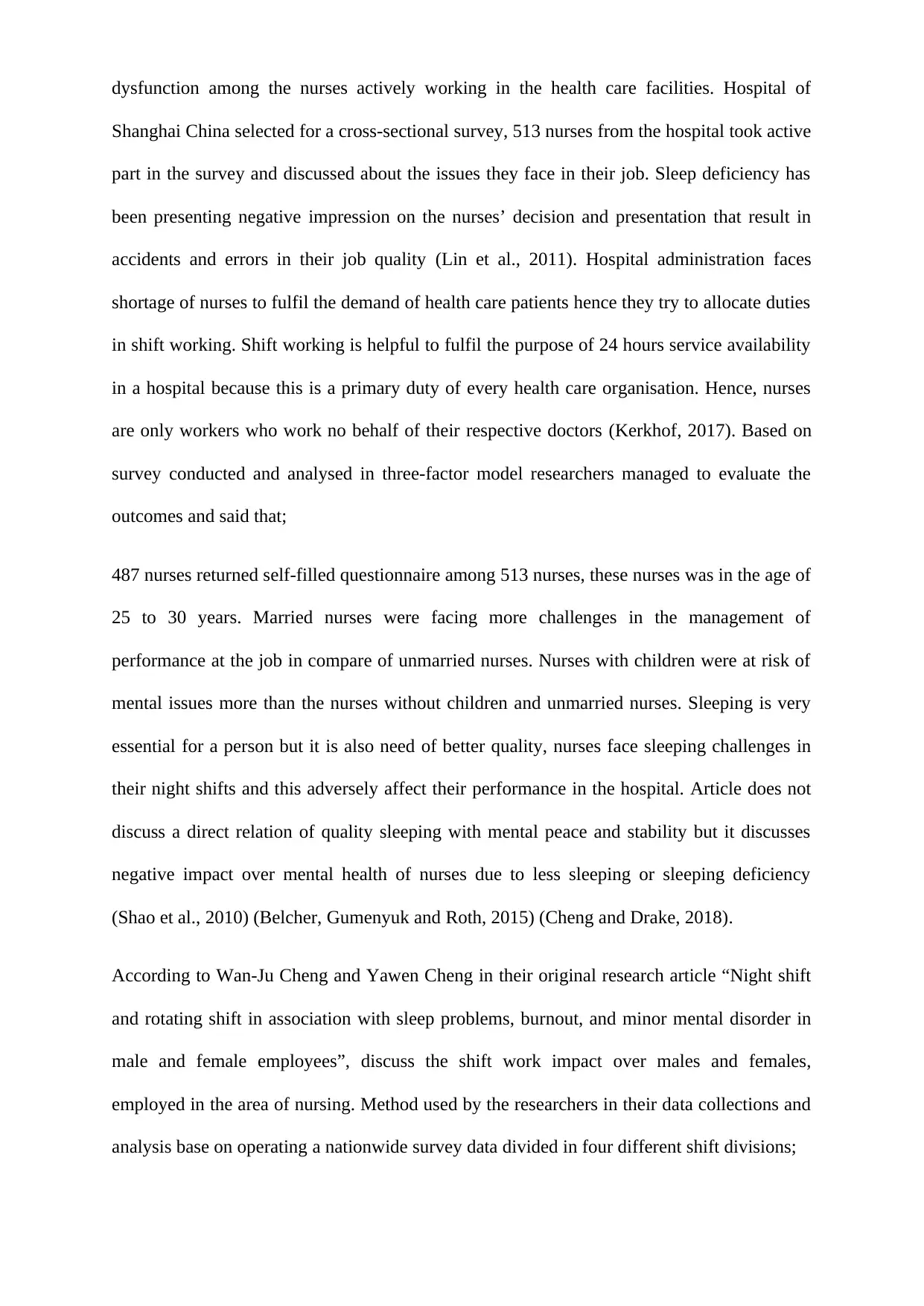
dysfunction among the nurses actively working in the health care facilities. Hospital of
Shanghai China selected for a cross-sectional survey, 513 nurses from the hospital took active
part in the survey and discussed about the issues they face in their job. Sleep deficiency has
been presenting negative impression on the nurses’ decision and presentation that result in
accidents and errors in their job quality (Lin et al., 2011). Hospital administration faces
shortage of nurses to fulfil the demand of health care patients hence they try to allocate duties
in shift working. Shift working is helpful to fulfil the purpose of 24 hours service availability
in a hospital because this is a primary duty of every health care organisation. Hence, nurses
are only workers who work no behalf of their respective doctors (Kerkhof, 2017). Based on
survey conducted and analysed in three-factor model researchers managed to evaluate the
outcomes and said that;
487 nurses returned self-filled questionnaire among 513 nurses, these nurses was in the age of
25 to 30 years. Married nurses were facing more challenges in the management of
performance at the job in compare of unmarried nurses. Nurses with children were at risk of
mental issues more than the nurses without children and unmarried nurses. Sleeping is very
essential for a person but it is also need of better quality, nurses face sleeping challenges in
their night shifts and this adversely affect their performance in the hospital. Article does not
discuss a direct relation of quality sleeping with mental peace and stability but it discusses
negative impact over mental health of nurses due to less sleeping or sleeping deficiency
(Shao et al., 2010) (Belcher, Gumenyuk and Roth, 2015) (Cheng and Drake, 2018).
According to Wan-Ju Cheng and Yawen Cheng in their original research article “Night shift
and rotating shift in association with sleep problems, burnout, and minor mental disorder in
male and female employees”, discuss the shift work impact over males and females,
employed in the area of nursing. Method used by the researchers in their data collections and
analysis base on operating a nationwide survey data divided in four different shift divisions;
Shanghai China selected for a cross-sectional survey, 513 nurses from the hospital took active
part in the survey and discussed about the issues they face in their job. Sleep deficiency has
been presenting negative impression on the nurses’ decision and presentation that result in
accidents and errors in their job quality (Lin et al., 2011). Hospital administration faces
shortage of nurses to fulfil the demand of health care patients hence they try to allocate duties
in shift working. Shift working is helpful to fulfil the purpose of 24 hours service availability
in a hospital because this is a primary duty of every health care organisation. Hence, nurses
are only workers who work no behalf of their respective doctors (Kerkhof, 2017). Based on
survey conducted and analysed in three-factor model researchers managed to evaluate the
outcomes and said that;
487 nurses returned self-filled questionnaire among 513 nurses, these nurses was in the age of
25 to 30 years. Married nurses were facing more challenges in the management of
performance at the job in compare of unmarried nurses. Nurses with children were at risk of
mental issues more than the nurses without children and unmarried nurses. Sleeping is very
essential for a person but it is also need of better quality, nurses face sleeping challenges in
their night shifts and this adversely affect their performance in the hospital. Article does not
discuss a direct relation of quality sleeping with mental peace and stability but it discusses
negative impact over mental health of nurses due to less sleeping or sleeping deficiency
(Shao et al., 2010) (Belcher, Gumenyuk and Roth, 2015) (Cheng and Drake, 2018).
According to Wan-Ju Cheng and Yawen Cheng in their original research article “Night shift
and rotating shift in association with sleep problems, burnout, and minor mental disorder in
male and female employees”, discuss the shift work impact over males and females,
employed in the area of nursing. Method used by the researchers in their data collections and
analysis base on operating a nationwide survey data divided in four different shift divisions;
Paraphrase This Document
Need a fresh take? Get an instant paraphrase of this document with our AI Paraphraser
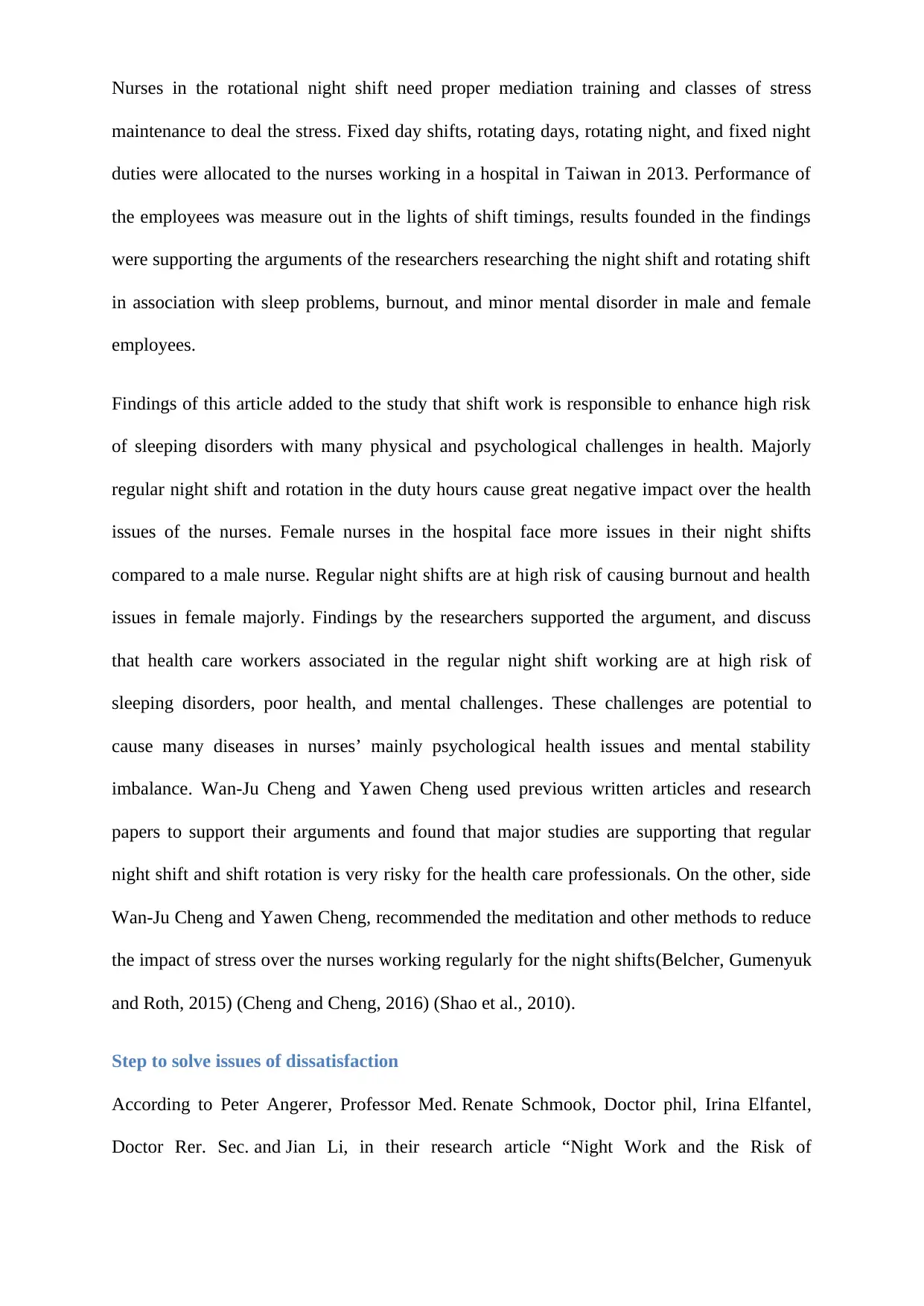
Nurses in the rotational night shift need proper mediation training and classes of stress
maintenance to deal the stress. Fixed day shifts, rotating days, rotating night, and fixed night
duties were allocated to the nurses working in a hospital in Taiwan in 2013. Performance of
the employees was measure out in the lights of shift timings, results founded in the findings
were supporting the arguments of the researchers researching the night shift and rotating shift
in association with sleep problems, burnout, and minor mental disorder in male and female
employees.
Findings of this article added to the study that shift work is responsible to enhance high risk
of sleeping disorders with many physical and psychological challenges in health. Majorly
regular night shift and rotation in the duty hours cause great negative impact over the health
issues of the nurses. Female nurses in the hospital face more issues in their night shifts
compared to a male nurse. Regular night shifts are at high risk of causing burnout and health
issues in female majorly. Findings by the researchers supported the argument, and discuss
that health care workers associated in the regular night shift working are at high risk of
sleeping disorders, poor health, and mental challenges. These challenges are potential to
cause many diseases in nurses’ mainly psychological health issues and mental stability
imbalance. Wan-Ju Cheng and Yawen Cheng used previous written articles and research
papers to support their arguments and found that major studies are supporting that regular
night shift and shift rotation is very risky for the health care professionals. On the other, side
Wan-Ju Cheng and Yawen Cheng, recommended the meditation and other methods to reduce
the impact of stress over the nurses working regularly for the night shifts(Belcher, Gumenyuk
and Roth, 2015) (Cheng and Cheng, 2016) (Shao et al., 2010).
Step to solve issues of dissatisfaction
According to Peter Angerer, Professor Med. Renate Schmook, Doctor phil, Irina Elfantel,
Doctor Rer. Sec. and Jian Li, in their research article “Night Work and the Risk of
maintenance to deal the stress. Fixed day shifts, rotating days, rotating night, and fixed night
duties were allocated to the nurses working in a hospital in Taiwan in 2013. Performance of
the employees was measure out in the lights of shift timings, results founded in the findings
were supporting the arguments of the researchers researching the night shift and rotating shift
in association with sleep problems, burnout, and minor mental disorder in male and female
employees.
Findings of this article added to the study that shift work is responsible to enhance high risk
of sleeping disorders with many physical and psychological challenges in health. Majorly
regular night shift and rotation in the duty hours cause great negative impact over the health
issues of the nurses. Female nurses in the hospital face more issues in their night shifts
compared to a male nurse. Regular night shifts are at high risk of causing burnout and health
issues in female majorly. Findings by the researchers supported the argument, and discuss
that health care workers associated in the regular night shift working are at high risk of
sleeping disorders, poor health, and mental challenges. These challenges are potential to
cause many diseases in nurses’ mainly psychological health issues and mental stability
imbalance. Wan-Ju Cheng and Yawen Cheng used previous written articles and research
papers to support their arguments and found that major studies are supporting that regular
night shift and shift rotation is very risky for the health care professionals. On the other, side
Wan-Ju Cheng and Yawen Cheng, recommended the meditation and other methods to reduce
the impact of stress over the nurses working regularly for the night shifts(Belcher, Gumenyuk
and Roth, 2015) (Cheng and Cheng, 2016) (Shao et al., 2010).
Step to solve issues of dissatisfaction
According to Peter Angerer, Professor Med. Renate Schmook, Doctor phil, Irina Elfantel,
Doctor Rer. Sec. and Jian Li, in their research article “Night Work and the Risk of
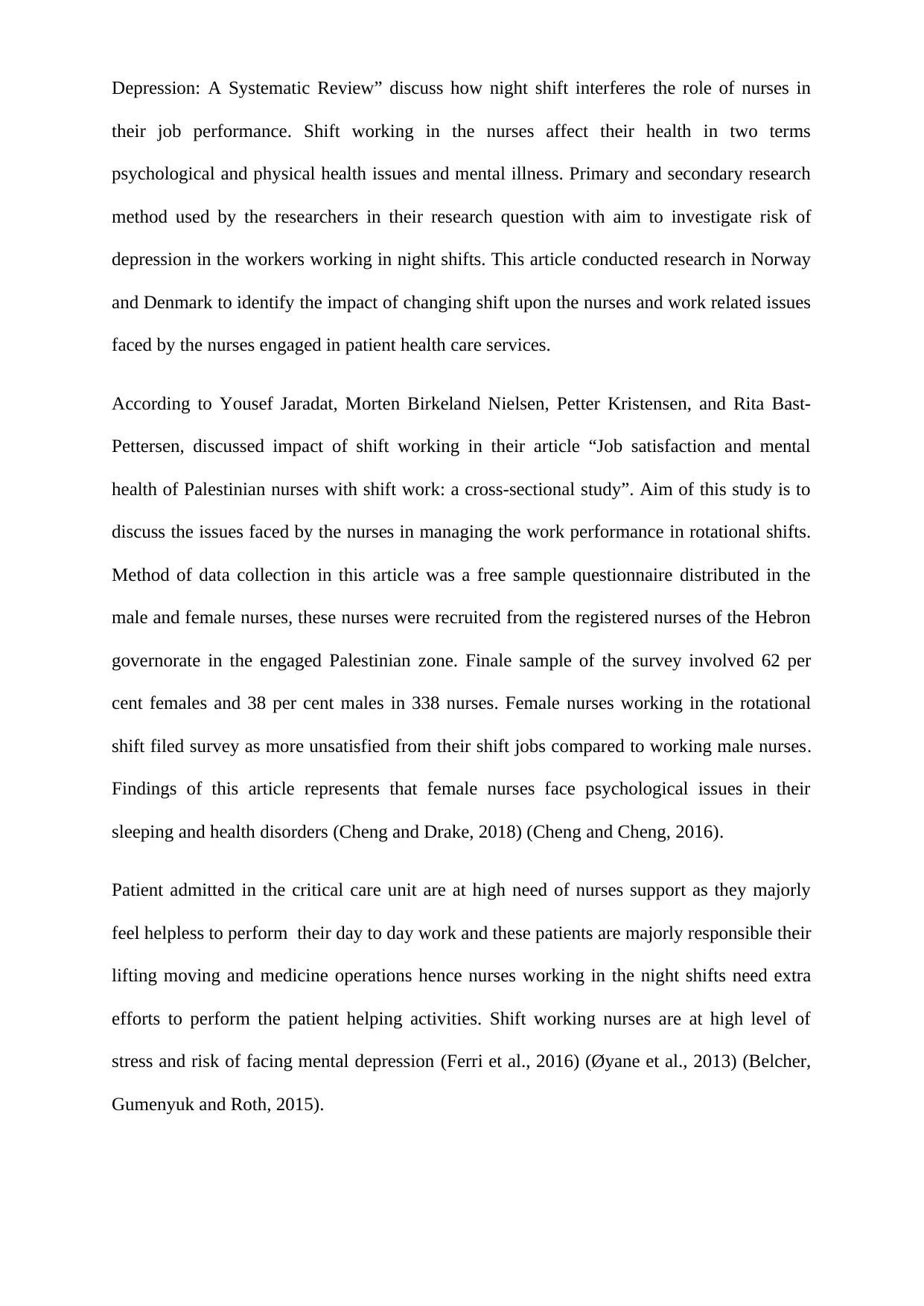
Depression: A Systematic Review” discuss how night shift interferes the role of nurses in
their job performance. Shift working in the nurses affect their health in two terms
psychological and physical health issues and mental illness. Primary and secondary research
method used by the researchers in their research question with aim to investigate risk of
depression in the workers working in night shifts. This article conducted research in Norway
and Denmark to identify the impact of changing shift upon the nurses and work related issues
faced by the nurses engaged in patient health care services.
According to Yousef Jaradat, Morten Birkeland Nielsen, Petter Kristensen, and Rita Bast-
Pettersen, discussed impact of shift working in their article “Job satisfaction and mental
health of Palestinian nurses with shift work: a cross-sectional study”. Aim of this study is to
discuss the issues faced by the nurses in managing the work performance in rotational shifts.
Method of data collection in this article was a free sample questionnaire distributed in the
male and female nurses, these nurses were recruited from the registered nurses of the Hebron
governorate in the engaged Palestinian zone. Finale sample of the survey involved 62 per
cent females and 38 per cent males in 338 nurses. Female nurses working in the rotational
shift filed survey as more unsatisfied from their shift jobs compared to working male nurses.
Findings of this article represents that female nurses face psychological issues in their
sleeping and health disorders (Cheng and Drake, 2018) (Cheng and Cheng, 2016).
Patient admitted in the critical care unit are at high need of nurses support as they majorly
feel helpless to perform their day to day work and these patients are majorly responsible their
lifting moving and medicine operations hence nurses working in the night shifts need extra
efforts to perform the patient helping activities. Shift working nurses are at high level of
stress and risk of facing mental depression (Ferri et al., 2016) (Øyane et al., 2013) (Belcher,
Gumenyuk and Roth, 2015).
their job performance. Shift working in the nurses affect their health in two terms
psychological and physical health issues and mental illness. Primary and secondary research
method used by the researchers in their research question with aim to investigate risk of
depression in the workers working in night shifts. This article conducted research in Norway
and Denmark to identify the impact of changing shift upon the nurses and work related issues
faced by the nurses engaged in patient health care services.
According to Yousef Jaradat, Morten Birkeland Nielsen, Petter Kristensen, and Rita Bast-
Pettersen, discussed impact of shift working in their article “Job satisfaction and mental
health of Palestinian nurses with shift work: a cross-sectional study”. Aim of this study is to
discuss the issues faced by the nurses in managing the work performance in rotational shifts.
Method of data collection in this article was a free sample questionnaire distributed in the
male and female nurses, these nurses were recruited from the registered nurses of the Hebron
governorate in the engaged Palestinian zone. Finale sample of the survey involved 62 per
cent females and 38 per cent males in 338 nurses. Female nurses working in the rotational
shift filed survey as more unsatisfied from their shift jobs compared to working male nurses.
Findings of this article represents that female nurses face psychological issues in their
sleeping and health disorders (Cheng and Drake, 2018) (Cheng and Cheng, 2016).
Patient admitted in the critical care unit are at high need of nurses support as they majorly
feel helpless to perform their day to day work and these patients are majorly responsible their
lifting moving and medicine operations hence nurses working in the night shifts need extra
efforts to perform the patient helping activities. Shift working nurses are at high level of
stress and risk of facing mental depression (Ferri et al., 2016) (Øyane et al., 2013) (Belcher,
Gumenyuk and Roth, 2015).
⊘ This is a preview!⊘
Do you want full access?
Subscribe today to unlock all pages.

Trusted by 1+ million students worldwide
1 out of 23
Related Documents
Your All-in-One AI-Powered Toolkit for Academic Success.
+13062052269
info@desklib.com
Available 24*7 on WhatsApp / Email
![[object Object]](/_next/static/media/star-bottom.7253800d.svg)
Unlock your academic potential
Copyright © 2020–2026 A2Z Services. All Rights Reserved. Developed and managed by ZUCOL.





